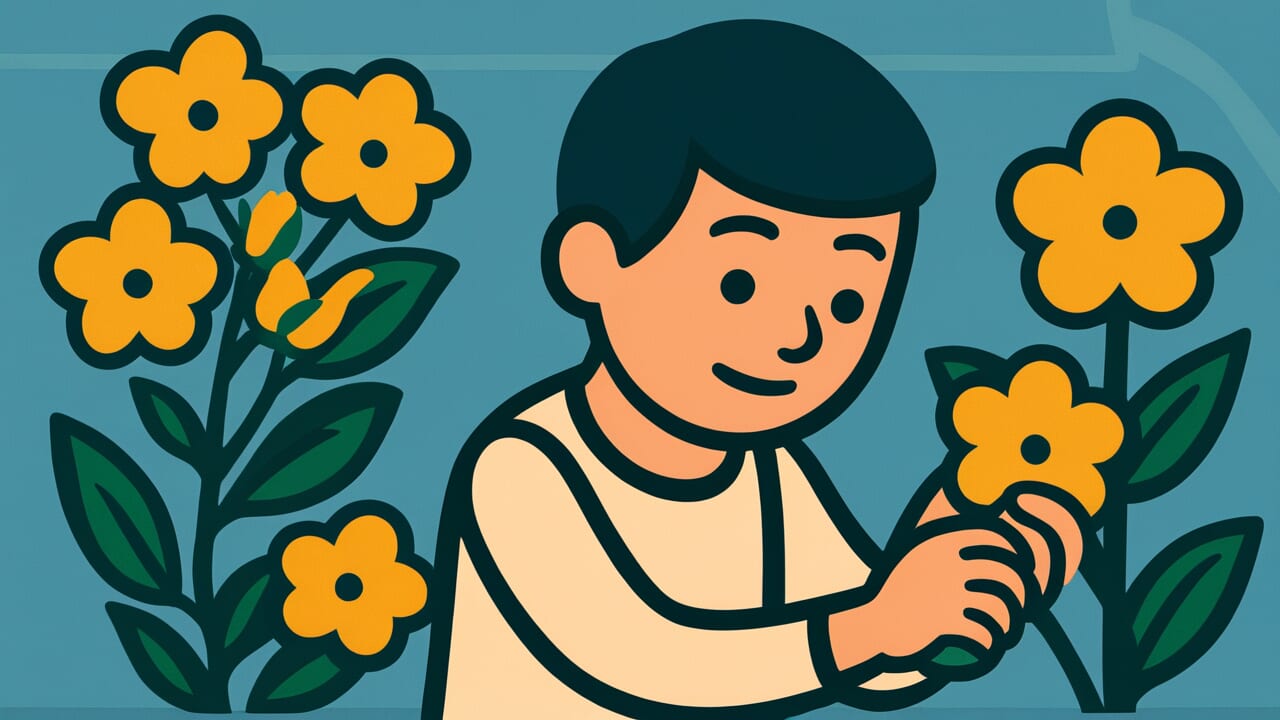How to Read “When appreciating flowers, be careful not to scatter the petals”
Hana wo shō suru ni tsutsushimite rihi ni itaru nakare
Meaning of “When appreciating flowers, be careful not to scatter the petals”
This proverb warns that moderation is essential when appreciating things. If you go too far, you’ll damage the very beauty you love. When you find beautiful flowers, getting too excited and touching them too much or getting too close will scatter the petals.
This concrete image teaches us about how to show love and interest properly.
We tend to become too absorbed in things we like or value. But when that passion goes too far, we can actually hurt what we love or diminish its true value.
By keeping an appropriate distance and showing restraint, we can truly enjoy the beauty and value of things for a long time.
Today, this teaching applies to many situations. It applies to hobbies, relationships, and how we approach work. Enthusiasm is important, but too much has the opposite effect.
This proverb teaches us the importance of this sense of balance.
Origin and Etymology
The exact source of this proverb is unclear. However, its structure suggests it may have been influenced by classical Chinese thought. Expressions like “be careful” and “do not” are written in a classical Chinese style.
These phrases connect to Confucian and Taoist teachings that value moderation.
The word “rihi” describes the scene of petals scattering and falling apart. You love beautiful flowers so much that you touch them too much or get too close. This causes the petals to scatter.
This concrete scene expresses a lesson about how to approach things in life.
Japan has long had a culture of “appreciating flowers.” Customs like cherry blossom viewing, plum blossom appreciation, and chrysanthemum exhibitions form the core of Japanese aesthetic sensibility.
At the same time, Japanese people deeply understand that beautiful things are fragile. If you handle them wrong, they will be damaged.
This proverb likely emerged from a fusion of Japanese delicate aesthetic sense and Chinese thought about valuing moderation. Through the familiar subject of flowers, it conveys wisdom that applies to all of life.
It teaches that love and passion also need appropriate distance.
Usage Examples
- I like growing bonsai, but as the saying “When appreciating flowers, be careful not to scatter the petals” teaches, it’s important not to overcare for them
- When watching my children grow, I try to keep an appropriate distance with the mindset of “When appreciating flowers, be careful not to scatter the petals”
Universal Wisdom
Humans have a desire to get closer to things they like or find beautiful. They want to touch more, to possess more. This desire itself is natural and healthy.
But this proverb teaches a deep truth. Even love and passion need “appropriate distance.”
Why do people destroy what they love? Because possessiveness, monopolistic desire, or the endless craving for “more” overtakes respect for the object itself.
Someone appreciating flowers should be enjoying their beauty. But before they know it, “their own enjoyment” becomes the goal. They forget about the flowers themselves.
This reversal causes the destruction of beautiful things.
Our ancestors deeply understood this human nature. Loving something and respecting it are different things. True love should be accompanied by moderation.
Beautiful things are beautiful simply by existing. All we can do is quietly watch over them and enjoy them from an appropriate distance.
This wisdom also applies to human relationships. If you bind someone you love, the relationship breaks. If you care too much, you rob them of freedom.
To truly love something means respecting the state in which it can be most beautiful.
When AI Hears This
Petals attached to branches exist in a very low entropy state. In other words, they’re highly ordered. The petal cells are arranged regularly, pigment molecules are distributed in specific patterns, and moisture is maintained.
This order was created by the plant using enormous energy.
But the act of scattering flowers destroys this order instantly. Petals fall to the ground, cell structures begin to collapse, and molecules diffuse randomly.
This is an irreversible change from order to disorder, as shown by the second law of thermodynamics.
What’s important is that returning scattered petals to their original branch is physically almost impossible. Even if humans manually put them back, the cellular-level connections cannot be restored.
What’s interesting is that the reason humans find flowers beautiful lies precisely in this low entropy state. Our brains evolved so that the reward system activates when we recognize high order or patterns.
In other words, beauty can be seen as a sensor that detects low entropy.
This proverb teaches us to be conscious of the “arrow of time” when appreciating beauty. Order naturally moves toward disorder. In that one-way process, we should cherish the beauty that exists now.
This is an extremely rational attitude aligned with the fundamental laws of the universe.
Lessons for Today
Modern society is filled with the desire for “more, more.” More information, more stimulation, more results. On social media, we check posts from people we like over and over.
We pour endless time and money into hobbies. At work, we push ourselves seeking perfection.
But this proverb asks us a question. Is that passion really benefiting its object?
What’s important is knowing the difference between loving and obsessing. In child-rearing, friendships, and work, keeping appropriate distance can actually produce better results.
Trust in someone’s growth and watch over them. Step back from your own desires and respect the object’s inherent value. This attitude is the secret to building long, rich relationships.
If you’re absorbed in something right now, try pausing for a moment. Is your passion making its object shine, or exhausting it?
Sometimes stepping back to observe is the deepest expression of love. Within moderate distance lies an encounter with true beauty.



Comments